|
Last month, Mel and Dee Bixley went to The Gambia and visited many of the African Oyster Trust's projects. The following blog post is Part III of a series of articles based on extracts from Dee's diary. You can read the background to their involvement with the Trust, plus the first and second extracts from the diaries. Friday 7th February 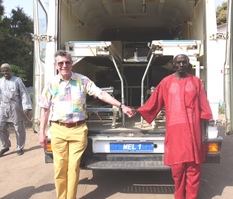 The first thing we spot as we arrive at the health centre is the ambulance. Chalo, its driver, proudly demonstrates how everything works, stopping long enough to have his photo taken. Next we tour the very impressive clinic, meet the dedicated staff, visiting the laboratory, the wards and even the store cupboard! 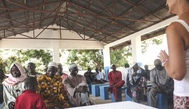 It is now time for a special meeting, which we suspect is in our honour. The Chief of Jarra Centre is in attendance, the village Mayor, Elders and Imams, all gathered to give thanks for the ambulance. Kira is thrilled that they are all here on time! We know that there were huge celebrations at the time the ambulance was brought to the village in 2011, so it is very kind of them to hold this meeting. Through a translator, Fanding tells the story of the ambulance. Then the Chief, an Imam and another Imam speak. They are effusive in their thanks but also encourage us to extend our efforts! Indeed, the second Imam has a curious request. Mel whispers: “Has he just requested a trolley for fat people?” Yes he has. An irony, perhaps, in a country where so many are hungry. We are presented with ceremonial outfits and Certificates of Appreciation and we have the opportunity to present Chalo with a personal card and gift. By now it is late morning and aware of my interest in psychiatry, Kira has arranged a visit to the nearby psychiatric unit. She has told me that in the whole of Gambia there is only one fully trained psychiatric nurse, and not one psychiatrist! So I’m not a little wary of what we will find. We are met by the man in charge, who greets us warmly. A ‘traditional’ doctor, he is tall and flamboyantly dressed, sweeping ahead to show us several wards. In the last one a woman, psychotic when she was admitted following the birth of her baby, now lies quietly on the floor, shielding her face but eyeing us through her fingers. Lying nearby, her baby is completely covered by a shawl to keep away mosquitoes. The doctor then ushers us into his office and Kira and he discuss how they can work together in obtaining psychiatric medication, never an easy task in Gambia. We learn afterwards that this is the first time the doctor has accepted the idea that his herbs do not help every condition. Now he is actually asking for help. We feel we have witnessed a significant breakthrough in what had seemed an intransigent situation. 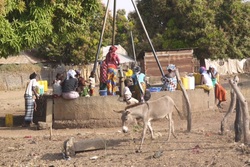 Fanding has invited us for lunch at his compound and his wife, who we saw teaching at the school earlier, has come back to complete the preparations. We eat in the customary way from one shared bowl and it is a delicious meal. Back at the health centre, a committee meeting is held outside, and we are invited to sit in. Following prayers, the proceedings are translated, perhaps for our benefit rather than for Kira. I suspect Kira understands rather more than she admits! But how she manages when they all speak at once in Mandinka, I don’t know. 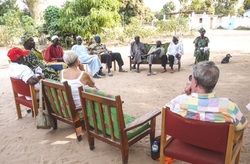 As they move on to next year’s budget, the committee resort to further praying. Afterwards, Kira states that although she is grateful for their prayers, they must remember that it is their own hard work which has enabled them to make the clinic successful, both medically and financially. She says this in such a way that I feel mighty proud to be sitting next to her. My mind wanders as the meeting continues and village ladies arrive for the celebrations to follow. One or two come through the gate and sit on their water carriers (later used as drums), waiting patiently. Outside, a group of young children play in the dust. 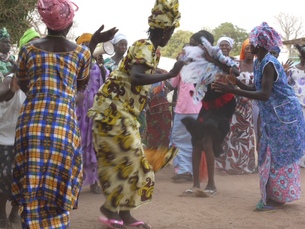 The celebrations underway, the women sing about village life, perhaps part of an oral history handed down through the generations. Once there was no ambulance, they chant, and sick people travelled by donkey cart to hospital. When the drumming reaches a crescendo, more women and children are inspired to perform short bursts of an exquisitely rhythmic pounding of the ground. Fanding pulls me up and shows how to reward the ladies’ efforts. The game is to give them notes of small worth but lots of them, which they tuck into their costumes. The money they raise will go towards village projects, such as the women’s garden, loudspeaker batteries, even pocket money for themselves. I hope so. Mel is sitting next to the ambulance driver, Chalo, who has received some much deserved attention. His quiet mantra throughout the day - ‘Happy Happy Happy’ – will be a treasured, abiding memory for us.
0 Comments
Last month, Mel and Dee Bixley went to The Gambia and visited many of the African Oyster Trust's projects. The following blog post is Part II of a series of articles based on extracts from Dee's diary. You can read the background to their involvement with the Trust, plus the first extract from the diaries, here. Thursday 6th February At 10am we begin our journey up country. Our final destination tomorrow will be Jappineh Health Centre, the home of the ambulance. We collect Fanding en route and he and Kira debate whether this will be a goat, cow or donkey day. In fact, the leisureliness with which all these creatures wander into the road makes it a ‘mixed’ day. Driving in Gambia has many challenges. Most of the unmade local roads have huge potholes to negotiate. And where sand has accumulated, the need to accelerate and go with the ‘skid’ is imperative if you don’t want to get stuck. Once we understand that Kira knows exactly what she’s doing, we relax! 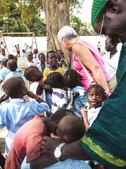 As to Gambia’s major roads, there are regular check points where you must stop for the police, military or immigration authorities. However, as soon as they realise its Kira, their stern attitudes soften and they salute with alacrity. The fact that a gun is pointing at us from a camouflaged hut nearby doesn’t matter - Kira has clearly earned their respect and affection.A visit to The Big Tree Nursery received an ecstatic welcome for Kira and Fanding! We arrive at Moses Guest House in Soma, the best place to stay near Jappineh. Moses is a small establishment, five or six rooms situated around a courtyard, where we drink tea from pint mugs. Kira must read something in my face - “How’s your comfort zone, Dee?!” she teases. She is right to do so. 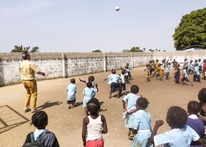 After all, we have a flush loo, a tap in the wall for cleaning our teeth, and Kira has thoughtfully supplied a travel kit of essentials. What’s more, our host has been out and purchased toilet paper for us. When people are this keen to please - to hell with my OCD tendencies! In 2011, Mel Bixley's extraordinarily generous donation made possible the acquisition of an ambulance for the Sir Howard Dalton Clinic in Jappineh. You can read the full story here, and see reports throughout the news diary of the lives being saved every day as a result. Last month, Mel and his wife Dee went to The Gambia and visited many of the African Oyster Trust's projects - including, of course the Sir Howard Dalton Clinic. These blog posts over the next few days are based on extracts of Dee's diary. You can read part II here. 4th February 2014 Three years ago my husband Mel funded an ambulance for the African Oyster Trust’s health centre in Jappineh. Even Gambia’s President Jammeh became involved in the quest for an ambulance and it has been heart warming to read about how it is saving lives. Now we have come to Gambia to see it for ourselves. During our time here, Kira Dalton is going to show us some of the charity’s many projects, and today she and Fanding (her second in command) are taking us to see a nursery and adjoining school in Serrekunda, near Banjul. 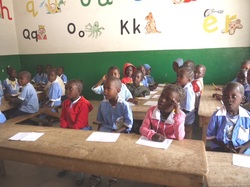 The Stepping Stones Nursery, formally opened in March 2013, has three classrooms and was built on land donated by Kunkujang Keitayah Lower Basic School, next door. We meet many enthusiastic teachers and children, and witness the Jolly Phonics teaching method in action. The secret of its success seems to lie in the fun of it, the way it captures the imagination of young minds. 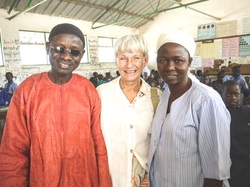 But fun or not, one thing is already abundantly clear: Gambian children want to learn. At Kunkujang Keitayah, we meet the Headmaster, Edrissa Bojang. He is a very impressive man, Kira tells us later, whose roles include Chairmanship of the Gambia Teachers Union Cooperative Credit Union (GTUCCU). In his office, I spot a photo of he and his wife and remark upon how pretty she is. He pretends to be annoyed, “What about me? Am I not handsome?!” A chart on his wall shows that the school has almost 2,000 pupils. |
News DiaryThe News Diary is a regular account of all that is happening at The African Oyster Trust. Please pop back for regular updates, follow us on Twitter or sign up for our RSS feed to have the latest news sent straight to your computer! AuthorsThe news diary is written by a number of people close to the work of the African Oyster Trust, including founder James Holden, his co-directors, trustees and volunteers. Archives
February 2024
Categories
All
|

 RSS Feed
RSS Feed